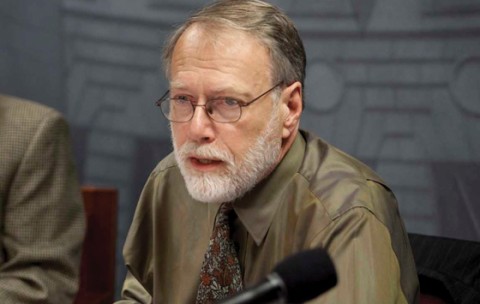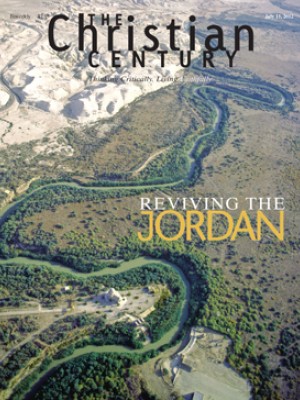Culture changers: David Hollinger on what the mainline achieved

In his presidential address to the 2011 meeting of the Organization of American Historians, David Hollinger focused on the contributions and successes of ecumenical Protestants in their mid-20th-century encounter with diversity. Hollinger, professor of history at the University of California at Berkeley, specializes in American intellectual history. His survey The American Intellectual Tradition is a widely used textbook. Among his other books are Cosmopolitanism and Solidarity, Science, Jews, and Secular Culture and Postethnic America: Beyond Multiculturalism.
In your account of mid-20th-century Protestantism, you use the term ecumenical Protestant instead of mainline, mainstream or liberal. Why do you make this choice?
I use ecumenical because it is much more specific historically and analytically than mainstream or liberal. Mainstream is a term that is too general and can cover almost anything. Liberal, too, is a term that you can apply to culture or politics as well as theology.
Read our latest issue or browse back issues.
Ecumenical refers to a specific, vital and largely defining impulse within the groups I am describing. It also provides a more specific and appropriate contrast to evangelical. The term evangelical came into currency in the midcentury to refer to a combination of fundamentalists, Pentecostals, followers of holiness churches and others; ecumenical refers to the consolidation of the ecumenical point of view in the big conferences of 1942 and 1945.
We’ve become so accustomed to the narrative of “mainline decline” that it is difficult to get our minds around a more nuanced version of this story. How do you tell this story?
The ecumenical leaders achieved much more than they and their successors give them credit for. They led millions of American Protestants in directions demanded by the changing circumstances of the times and by their own theological tradition. These ecumenical leaders took a series of risks, asking their constituency to follow them in antiracist, anti-imperialist, feminist and multicultural directions that were understandably resisted by large segments of the white public, especially in the Protestant-intensive southern states.
It is true that the so-called mainstream lost numbers to churches that stood apart from or even opposed these initiatives, and ecumenical leaders simultaneously failed to persuade many of their own progeny that churches remained essential institutions in the advancement of these values.
But the fact remains that the public life of the United States moved farther in the directions advocated in 1960 by the Christian Century than in the directions then advocated by Christianity Today. It might be hyperbolic to say that ecumenists experienced a cultural victory and an organizational defeat, but there is something to that view. Ecumenists yielded much of the symbolic capital of Christianity to evangelicals, which is a significant loss. But ecumenists won much of the U.S. There are trade-offs.
We usually say, “The victors write history,” but here you seem to be saying, “The victors refuse to claim victory.” Why is that?
The victors are slow to claim victory because they too often assume that numbers of church members are what counts most. If they had a more capacious understanding of the ways in which religion can function in society, they might be able to feel more pride in what happened. The great Anglican archbishop William Temple used to say that any church aware of its deepest missions would be willing to cease to exist if it advanced its ultimate goals.
The press and many spokespersons for evangelicalism dominate the conversation about American religion by trumpeting the numerical flourishing of evangelical fellowships of many kinds, and ecumenical Protestants have often accepted the terms of the conversation set by the evangelicals and the predictably numbers-first press.
What role did ecumenical Protestants play in shaping contemporary culture that are perhaps too easily forgotten today?
Ecumenical Protestants were way ahead of the evangelicals in accepting a role for sex beyond procreation and in supporting an expanded role for women in society. The ecumenical Protestants understood full well that the Jim Crow system could not be overturned without the application of state power, rejecting the standard line of Billy Graham and many other evangelicals that racism was an individual sin rather than a civil evil. The ecumenical Protestants developed a capacity for empathic identification with foreign peoples that led them to revise their foreign missionary project, diminishing its culturally imperialist aspects—and that led them, further, to the forefront of ethnoracially pluralist and egalitarian initiatives as carried out by white Americans. The ecumenical Protestants resoundingly renounced the idea that the United States is a Christian nation, while countless evangelical leaders continue to espouse this deeply parochial idea.
What were the not quite fatal flaws of ecumenical Protestantism in the 20th century?
This question is a bit difficult for me to address since I am not an ecumenical Protestant. Taking this question from the point of view of the mainstream churches, one could argue that they would be a lot better off today, and might have retained a more prominent role in American life, had they developed styles of ecumenism that had more respect for the role of denominational communions and local congregations in providing a sense of belonging and intimacy. The sweepingly antidenominational pronouncements of ecumenical leader Eugene Carson Blake and Episcopal bishop James A. Pike, for example, and perhaps even the priorities of the Consultation on Church Union, could easily be seen as aloof from the lives of parishioners.
Blake and Pike, for example, advocated the elimination of all denominational distinctions. One reason was that they were so afraid of the Catholics. Catholic unity was something they wanted to counter with Protestant unity. But a lot of people in small congregations felt dismissed by these kinds of pronouncements.
Reading Union Theological Seminary’s Henry Pitney Van Dusen today, you wonder how he could proceed while seeing so little of the world immediately around him. He got the globe better than he got the Methodists and the Presbyterians.
Do you see the line between ecumenical and evangelical Protestants dissolving or growing more distinct?
Do you know Fosdick’s 1922 sermon “Shall the Fundamentalists Win?” published in the Christian Century? I am advocating a kind of re-creation of a Fosdickian mentality.
The ongoing accommodation between ecumenical and evangelical Protestants may well continue, but if it does, I fear that it will be at the cost of an opposite accommodation that deserves more attention than it has received. Perhaps voices like that of the Christian Century and the intellectual leaders of the ecumenical seminaries and denominations should more aggressively criticize the religious ideas proclaimed by the most visible of the evangelicals in American life today.
To be sure, secular intellectuals and journalists comment on these ideas in the New Yorker and now and then on the op-ed pages of the New York Times, but believing Protestants have an authority with the faith-affirming public that the rest of us do not have.
A more vigorous attack on obscurantist versions of the faith, a more insistent discussion of the latest in biblical scholarship, a yet more widespread commentary on the tendency of many of today’s evangelical leaders to focus on tiny segments of scripture—this might be a valuable service. And might it cement an accommodation not with the evangelicals, but with secular intellectuals? That might be a good thing. The salient solidarity today may not be with the community of faith but among those who accept Enlightenment-generated standards for cognitive plausibility.
After reading your work, I’ve taken to calling Barack Obama the leading ecumenical Protestant in the world today. Am I on to something there?
Barack Obama is a standard-issue ecumenical Protestant. His positions on church and state are a great example of that.
What’s the future of conservative evangelicalism in light of the trajectory you chart?
The chances of the contemporary form of evangelical Protestantism surviving and flourishing for quite some time are maximized by the odd constitutional structure of American politics, which assigns considerable authority to the so-called red states. Much of the governing of the country and the electoral college depend on people outside urban centers. We don’t have one-person, one-vote; we have this enormous, weighted power in the hands of states. That is a structural consideration that can yield a continuing flourishing of conservative Protestantism.
Another consideration is the reluctance of liberal Protestants to vigorously criticize the leading ideas of evangelical Protestants. As long as this continues, there is a discursive vacuum which means the press will continue to treat these family values folks as the voice of American religion. Only if faith-affirming voices get into the conversation more vigorously is that likely to change. Secular voices do not have as much pull in that conversation.
You have called ecumenical Protestantism a halfway house, if not an actual slippery slope, to secularism. Are you saying American culture is fated to be post-Protestant?
I don’t think the future is clear. I am not saying that everyone who comes out of the ecumenical tradition is doomed to be post-Protestant. I am saying that if that happens to a significant number of people, that doesn’t seem like such a bad thing. You could argue that a lot of post-Protestants are closer to the ecumenical tradition than the highly visible evangelical Protestants in the United States.
What does it mean to be post-Protestant? If it means that you are advancing in culture and politics a series of values for which ecumenical Protestantism has been a historical vehicle—well, there are a lot more vehicles than there used to be. Ecumenical Protestantism can reconstitute itself as a prophetic minority rather than measuring itself in terms of how many Americans sign up.
I am speaking from a secular perspective that has a lot of respect for religious believers. I don’t think that all religion is headed for history’s dustbin. But it is not for me to say.
How did you get interested in this subject? How did it lead from your earlier work?
I have been frustrated by the gaps in our scholarship on American religion in the 20th century, which has seemed to me to be dominated by the history of fundamentalism and evangelicalism. While I was writing my book on multiculturalism, I became aware that many of the precursors of what came to be called multiculturalism, many of the early formulators, were ecumenical Protestants. So-called liberal Protestants had provided a facilitating function for the development of culture for many Americans.






